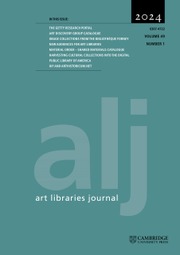No CrossRef data available.
Article contents
Mapping second wave feminist periodicals: Networks of conflict and counterpublics, 1970–1990
Published online by Cambridge University Press: 10 July 2020
Abstract
The second wave of feminism saw a surge in women's publishing that resulted in a women-controlled communications infrastructure within feminist periodicals. As a result of women actively contributing to the ‘letters to the editor’ pages, second wave periodicals offer rich source material for tracing the development of feminist theory. Indicative of an invested and participatory counterpublic of readers, second wave periodicals also reveal the internal disagreements and debates which feminists were grappling with during the 1970s and 1980s. Spare rib, Trouble & strife, Revolutionary/radical feminist newsletter and Outwrite were feminist periodicals that all published coverage of the 1982 Lebanese war, and discussed the subsequent implications of anti-Zionism and anti-Semitism. Conflict over how correctly to cover the disagreements, both editorially and ideologically, dominated the correspondence pages of these periodicals. However, mediating conflict was uniquely suited to the medium of a periodical, as it allowed for less outspoken women to see themselves as contributors and add to a plurality of opinion. The visual mapping of these debates by means of Social Network Analysis highlights how the circulation of feminist periodicals enabled communication in the form of a webbed network of debate. The periodical format, and in particular the letters pages, offered a much-needed forum for criticism and disagreement to play out, and in turn the advancement of feminist discourse. As historical source material, they tell the story of a complex and diverse movement, unsettling the notion of a neat chronology of distinct decades of feminist history.
- Type
- Research Article
- Information
- Copyright
- Copyright © ARLIS, 2020
References
1. Gitelman, Lisa, Paper Knowledge: Toward a Media History of Documents (Duke University Press, 2014). xCrossRefGoogle Scholar.
2. Fraser, Nancy, ‘Rethinking the Public Sphere: A Contribution to the Critique of Actually Existing Democracy,’ Social Text, no. 25/26 (1990): 67CrossRefGoogle Scholar.
3. Ibid.
4. In her study of women's letters during the second wave, Margaretta Jolly argues that ‘letters show more poignantly than autobiography or even novels of the period the struggle to realize ideals of sisterhood from within and the puzzle of how to create genuine coalition and community across political gulfs of race or class or sheer differences of temperament.’ Margaretta Jolly, In Love and Struggle: Letters in Contemporary Feminism (Columbia University Press, 2008). 4.
5. Hewitt, Nancy, ed., No Permanent Waves: Recasting Histories of U.S. Feminism (New Brunswick: Rutgers University Press, 2010). 6CrossRefGoogle Scholar. Scott, Quoting Joan W., ‘Fantasy Echo: History and the Construction of Identity’, Critical Inquiry 27 (Winter 2001): 284–304CrossRefGoogle Scholar.
6. Beins, Agatha, Liberation in Print: Feminist Periodicals and Social Movement Identity (University of Georgia Press, 2017). 4Google Scholar.
7. Freeman, Jo, The Politics of Women's Liberation (New York: Longman, 1975). 11Google Scholar0.
8. Cadman, Eileen, Chester, Gail, and Pivot, Agnes, Rolling Our Own: Women as Printers, Publishers and Distributors (London: Minority Press Group, 1981). 81Google Scholar.
9. Ibid.
10. Ibid. 86. Quoting Editorial in Spare Rib, Issue 98, September 1980.
11. Fraser, ‘Rethinking the Public Sphere: A Contribution to the Critique of Actually Existing Democracy.’ 68.
12. Martha Allen, ‘The Development of Communication Networks Among Women, 1963–1983: A History of Women's Media in the U.S.’ Women's Institute for Freedom of the Press, 1988, http://www.wifp.org/womens-media/history-of-womens-media/. Accessed 27 March 2020.
13. Daly, Mary and Caputi, Jane, Websters’ First New Intergalactic Wickedary of the English Language (Boston: Beacon Press, 1987). 149Google Scholar.
14. ‘Networks,’ Swindon Women's Network Newsletter, no.8 (1986): 2.
15. Mckinney, Cait, ‘Newsletter Networks in the Feminist History and Archives Movement,’ Feminist Theory 16, no.3 (2015): 313CrossRefGoogle Scholar.
16. Hadi, Issam Abdel and Odeh, Rasmiya, ‘Silenced,’ Outwrite 4 (1982). 8Google Scholar.
17. Collective, Outwrite, ‘Statement from Outwrite,’ Outwrite 5 (1982). 2Google Scholar.
18. Roisín Boyd, ‘Women Speak Out Against Zionism,” Spare Rib, no.121 (1982). 22–23.
19. Shulman, Sheila et al. , ‘About Anti-Semitism,’ Spare Rib, no.123 (1982). 20Google Scholar.
20. Collective, Spare Rib, ‘Editorial,’ Spare Rib, no.126 (1983). 4Google Scholar.
21. Collective, Spare Rib, ‘Editorial,’ Spare Rib, no.130 (1983). 4Google Scholar.
22. Ibid.
23. Ibid.
24. Keiner, Judy, ‘Anti-Semitism: Letter,’ Revolutionary and Radical Feminist Newsletter, no.13 (1983). 12Google Scholar.
25. Ibid.
26. Ibid. 17.
27. Collective, Spare Rib, ‘Sisterhood… Is Plain Sailing,’ Spare Rib, no.132 (1983). 24Google Scholar.
28. Ibid. 27.
29. Saunders, Lesley, ‘Making Racism an Urgent Issue,’ Spare Rib, no.134 (1983). 44Google Scholar.
30. Williams, Stella, ‘In Order to Change Everything Must Be Opened Up,’ Spare Rib, no.134 (1983). 45Google Scholar.
31. Bryce, Jane, ‘Your Problems Are Our Problems Too,’ Spare Rib, no.134 (1983). 46Google Scholar.
32. Bowen, Romi and Manning, Bernadette, ‘Trouble and Strife: Anti-Semitism and Racism,’ Trouble and Strife, no.4 (1984). 4Google Scholar.
33. Mckinney, ‘Newsletter Networks in the Feminist History and Archives Movement.’
34. Schulman, Sarah, Conflict Is Not Abuse (Vancouver: Arsenal Pulp Press, 2016). 20Google Scholar.
35. Ibid. 20–21.
36. Bazin, Victoria and Waters, Melanie, ‘Mediated and Mediating Feminisms: Periodical Culture from Suffrage to the Second Wave,’ Women: A Cultural Review 24, no.7 (2017): 349Google Scholar.
37. Beins, Liberation in Print: Feminist Periodicals and Social Movement Identity. 146.
38. Meaghan Morris, The Pirate's Fiancée: Feminism, Reading, Postmodernism (Verso, 1988). 69.
39. Hewitt, No Permanent Waves: Recasting Histories of U.S. Feminism. 4. Quoting Vivien Labaton and Martin, Dawn Lundy, eds., The Fire This Time: Young Activists and the New Feminism (New York: Anchor Books, 2004). xxv., xxviiGoogle Scholar.


